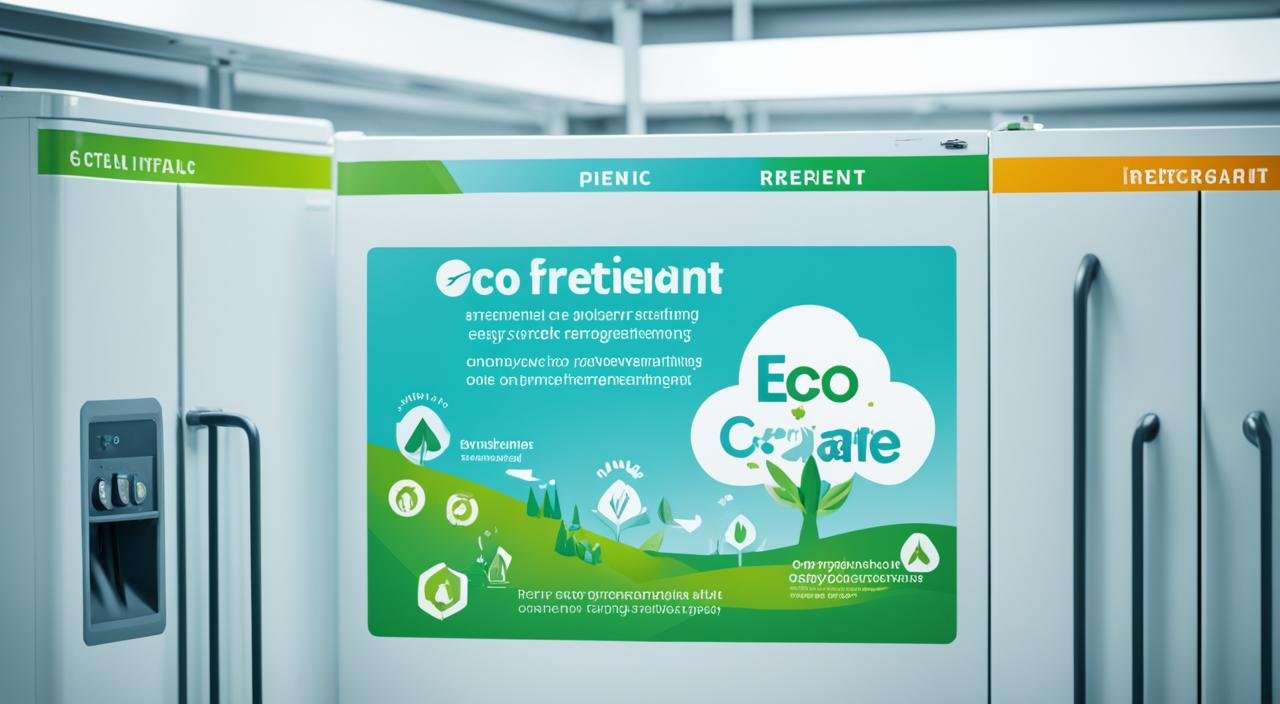In today’s world, where environmental consciousness is on the rise, it’s important to consider how our dietary choices impact the planet. By adopting an eco-friendly diet, you can not only nourish your body but also contribute to a more sustainable lifestyle. Making environmentally conscious food choices is a powerful way to reduce your carbon footprint and make a positive impact on the health of our planet.
So, what exactly is an eco-friendly diet? It involves making mindful decisions about the types of foods you consume and the way they are produced. It’s about choosing planet-friendly nutrition and embracing sustainable food consumption practices. By opting for a low carbon footprint diet and engaging in earth-friendly eating habits, you can pave the way for a healthier you and a healthier Earth.
In this article, we will explore actionable tips and insights on how to adopt an eco-friendly diet. From prioritizing plants in your meals to reducing meat consumption and supporting local agriculture, we will cover various aspects of sustainable eating. By incorporating these eco-conscious food habits into your life, you can take a step towards creating a better future for yourself and the planet.
Key Takeaways:
- Adopting an eco-friendly diet can help reduce your carbon footprint and contribute to a more sustainable lifestyle.
- By prioritizing plant-based foods, you can make a positive impact on the environment and improve your personal health.
- Reducing meat consumption can help reduce greenhouse gas emissions and conserve resources.
- Choosing sustainable seafood options can protect marine ecosystems and support responsible fishing practices.
- Supporting local and sustainable agriculture can reduce the environmental impact of food production and foster a sense of community.
Prioritize Plants in Your Diet
One of the key ways to have an eco-friendly diet is to prioritize plants in your meals. By adopting a plant-based diet or simply increasing the amount of vegetables and fruits in your daily meals, you can make a positive impact on both your health and the environment.
When you prioritize plants, you reduce the demand for animal products, which helps lower freshwater withdrawals, deforestation, and greenhouse gas emissions associated with livestock production. Additionally, plant-based diets are often rich in essential nutrients, fiber, and antioxidants, providing numerous health benefits.
Emphasizing vegetables and fruits in your diet offers an array of flavors, textures, and nutritional profiles. You can experiment with a variety of plant-based recipes, incorporating diverse ingredients and cooking techniques. Whether you choose to enjoy a colorful salad, a vibrant stir-fry, or a nourishing smoothie, the options for plant-based meals are limitless.
The Environmental Benefits of a Plant-Based Diet
Adopting a plant-based diet has several environmental benefits. Here are some key ways in which prioritizing plants in your diet contributes to sustainability:
- Reduced greenhouse gas emissions: Livestock agriculture is a major source of greenhouse gas emissions, particularly methane and nitrous oxide. By reducing meat consumption and shifting towards plant-based alternatives, you can help mitigate climate change.
- Preservation of natural resources: Animal agriculture requires substantial amounts of land, water, and feed. Prioritizing plants in your meals reduces the pressure on these resources, helping to conserve them for future generations.
- Protection of biodiversity: Agricultural activities associated with livestock production often lead to the destruction of natural habitats and the loss of biodiversity. By choosing plant-based options, you support the preservation of ecosystems and the species that inhabit them.
“The greatest service which can be rendered any country is to add a useful plant to its culture.” – Thomas Jefferson
With every plant-based meal you enjoy, you contribute to sustainable eating practices that prioritize the well-being of both people and the planet. By incorporating more vegetables, fruits, legumes, and grains into your diet, you can make a positive impact on the environment and promote a healthier, more sustainable future.
| Environmental Benefits of a Plant-Based Diet | Health Benefits of a Plant-Based Diet |
|---|---|
| Reduced greenhouse gas emissionsPreservation of natural resourcesProtection of biodiversity | Rich in essential nutrientsHigh in fiber and antioxidantsPotential for weight management |
Reduce Meat Consumption
Another important aspect of an eco-friendly diet is to minimize meat consumption. Meat production, especially beef, is a significant contributor to greenhouse gas emissions and requires large amounts of food, water, land, and energy. By choosing non-meat protein sources such as nuts, legumes, and tofu, you can reduce your carbon footprint and contribute to a more sustainable food system.
Benefits of Minimizing Meat Consumption
Minimizing meat consumption offers numerous benefits for both the environment and personal well-being. Here are some key advantages:
- Reduced greenhouse gas emissions: Meat production generates substantial amounts of greenhouse gas emissions, contributing to climate change. By choosing plant-based proteins, you can significantly reduce your carbon footprint.
- Conservation of resources: Meat production requires large amounts of food, water, land, and energy. Opting for non-meat protein sources minimizes the strain on these valuable resources, making your diet more sustainable.
- Health benefits: Plant-based proteins are generally lower in saturated fat and cholesterol than animal-based proteins. Incorporating more non-meat protein sources into your diet can promote heart health and reduce the risk of certain illnesses.
- Animal welfare: Reducing meat consumption helps improve animal welfare by reducing the demand for factory farming and supporting more humane and sustainable farming practices.
Exploring Non-Meat Protein Sources
When minimizing meat consumption, it’s essential to explore alternative protein sources that provide adequate nutrition. Here are some popular non-meat protein sources:
- Nuts and seeds: Almonds, walnuts, chia seeds, and hemp seeds are excellent sources of protein, healthy fats, and other essential nutrients.
- Legumes: Beans, lentils, and chickpeas are rich in protein, fiber, and various vitamins and minerals. They can be used in a wide range of dishes, from soups and stews to salads and spreads.
- Tofu and tempeh: These soy-based products are versatile and can be used as substitutes for meat in various recipes. They provide a good amount of protein and are rich in essential amino acids.
By incorporating these non-meat protein sources into your meals, you can enjoy a well-rounded, sustainable, and eco-conscious diet.
Comparison of Environmental Impact
| Protein Source | Carbon Footprint (kg CO2e per kg of protein) | Water Consumption (liters per kg of protein) | Land Use (m2 per kg of protein) |
|---|---|---|---|
| Beef | 58.6 | 15,415 | 164 |
| Chicken | 6.9 | 4,325 | 110 |
| Lentils | 0.9 | 577 | 3 |
| Tofu | 1.8 | 1,695 | 7 |
The table above highlights the stark differences in environmental impact between different protein sources. By choosing plant-based proteins like lentils and tofu, you can significantly reduce carbon dioxide emissions, water consumption, and land use associated with traditional meat production. Making a conscious choice to minimize meat consumption can make a substantial positive impact on the environment.
Choose Sustainable Seafood
When it comes to seafood, making sustainable choices is crucial for the health of our oceans and the future of marine ecosystems. Overfishing and harmful fishing practices have put many fish species at risk and damaged the delicate balance of our marine environment. By opting for sustainable seafood and supporting eco-friendly fishing practices, you can enjoy the benefits of seafood consumption while minimizing your impact on the ocean.
Why choose sustainable seafood?
Opting for sustainable seafood means choosing fish species that are caught or farmed in a way that limits their impact on the environment and helps preserve their populations for the future. It takes into account factors such as overfishing, habitat damage, and bycatch reduction. By selecting sustainable options, you can:
- Protect marine biodiversity and habitats
- Support fish populations and their ecosystems
- Promote responsible fishing practices
- Ensure seafood availability for future generations
How to identify sustainable seafood
Identifying sustainable seafood can be challenging, but there are several resources available to help you make informed choices. Look for:
- Certifications: Labels such as the Marine Stewardship Council (MSC) and Aquaculture Stewardship Council (ASC) indicate that the fish or seafood has been sustainably sourced and responsibly harvested.
- Seafood guides: Consult reputable seafood guides, such as those provided by organizations like Seafood Watch or the Blue Ocean Institute. These guides provide information on sustainable seafood choices, including which species to avoid.
- Traceability: Opt for seafood that can be traced back to its source. This ensures transparency and reduces the likelihood of mislabeling or illegal fishing.
Remember, sustainability also extends to the methods used to catch or farm seafood. Look for eco-friendly fishing practices such as:
- Trap or pot fishing
- Pole and line fishing
- Sustainable aquaculture practices
“Sustainable seafood choices not only protect the health of our oceans but also support the livelihoods of fishermen who rely on healthy fish populations. It’s a win-win for both the environment and the people.” – Julia Smith, Marine Conservation Expert
By choosing sustainable seafood, you can enjoy your favorite seafood dishes while contributing to a more sustainable food system and ensuring the long-term health of our oceans.
Support Local and Sustainable Agriculture
Supporting local and sustainable agriculture is a crucial step towards a more eco-friendly diet and a sustainable lifestyle. By choosing to buy local food from farmers markets, you not only get access to fresh and nutritious produce, but you also have the opportunity to connect with the people who grow your food. This direct relationship allows for a deeper understanding of the farming practices used and fosters a sense of community.
When you shop at farmers markets, you support local farmers and their families, contributing to the growth and sustainability of the agricultural sector in your area. By purchasing from these farmers, you help them continue their commitment to sustainable farming practices, such as avoiding harmful pesticides and promoting soil health.
Additionally, farmers markets often offer a wide variety of seasonal produce, which encourages you to incorporate locally grown foods into your meals. Locally sourced food has a smaller carbon footprint compared to imported produce, as it doesn’t require long-distance transportation.
Participating in community-supported agriculture (CSA) programs is another way to support local and sustainable agriculture. In a CSA program, individuals or families pay a fee to a local farm at the beginning of the growing season and, in return, receive a weekly share of the farm’s produce. This direct partnership ensures a consistent income for the farmers and allows consumers to enjoy a variety of fresh and locally grown fruits and vegetables throughout the growing season.
Benefits of Choosing Local and Sustainable Agriculture:
- Access to fresh and nutritious produce
- Support for local farmers and the local economy
- Reduction in the carbon footprint by minimizing transportation distances
- Encourages sustainable farming practices and soil health
- Promotes a sense of community and connection with food sources
“When you support local farmers, you not only invest in the health of your community but also in the sustainability of our food system.” – Jane Anderson, Sustainable Agriculture Advocate
In addition to shopping at farmers markets and participating in CSA programs, another way to support local and sustainable agriculture is by growing your own fruits and vegetables. This not only allows you to have complete control over the growing process but also provides an opportunity for food education for yourself and your family. By understanding where your food comes from and how it is grown, you can make more informed decisions about your food choices.
| Benefits of Supporting Local and Sustainable Agriculture | Considerations |
|---|---|
| Access to fresh, seasonal produce | Availability may vary depending on the region and growing season |
| Supports local farmers and the local economy | Higher prices compared to conventional produce |
| Reduces carbon footprint by minimizing transportation distances | May require more effort to find and visit farmers markets |
| Promotes sustainable farming practices and soil health | Limited variety compared to large-scale supermarkets |
| Fosters a sense of community and connection with food | Requires planning and commitment for participating in CSA programs or growing your own produce |
Practice Mindful Eating
Practicing mindful eating is a simple yet effective way to eat more sustainably. By focusing on what you’re eating and being aware of where your food comes from, you can make more conscious food choices. Mindful eating involves being present in the moment and fully experiencing the flavors, textures, and satisfaction that food brings.
When you practice mindful eating, you not only enjoy your meal on a deeper level, but you also become more attuned to your body’s hunger and fullness cues. This awareness can help you consume food more mindfully and reduce unnecessary food consumption, leading to healthier portion sizes.
Additionally, mindful eating can play a significant role in reducing food waste. By paying close attention to your hunger signals, you can avoid overbuying or overpreparing food, minimizing the amount of food that goes to waste. This not only benefits the environment but also saves you money.
“When you practice mindful eating, you not only enjoy your meal on a deeper level, but you also become more attuned to your body’s hunger and fullness cues.”
To further support sustainable food sources, incorporate locally sourced and seasonal ingredients into your meals. By doing so, you reduce the carbon footprint associated with long-distance food transportation and support local farmers and producers.
Here’s a table highlighting the benefits of practicing mindful eating:
| Benefits of Mindful Eating | |
|---|---|
| Reduces food waste by avoiding overconsumption | |
| Supports sustainable food sources by choosing locally sourced ingredients | |
| Promotes healthier portion sizes and balanced meals | |
| Enhances the enjoyment and appreciation of food |
By incorporating mindful eating practices into your daily life, you can make a positive impact on your health and the environment. Choose sustainable, locally sourced ingredients, savor each bite, and be mindful of the resources involved in producing your food.
The Benefits and Considerations of a Vegan Diet
Adopting a vegan diet, which excludes all animal products, can have both environmental and health benefits. Vegan diets have been shown to have a lower environmental impact in terms of land use, resource consumption, and greenhouse gas emissions.
Embracing a plant-based diet can significantly reduce the carbon footprint associated with food production and contribute to a more sustainable future.
Aside from the positive environmental impact, there are numerous health benefits associated with a vegan diet. Research has shown that individuals following a vegan lifestyle have a reduced risk of obesity, type 2 diabetes, cancer, and heart disease.
By eliminating animal products and focusing on plant-based sources of nutrition, vegans tend to consume fewer saturated fats and cholesterol while consuming higher amounts of dietary fiber, antioxidants, and phytochemicals.
However, it’s important to be mindful of potential nutrient deficiencies that can arise from a vegan diet.
Key Nutrients to Consider
While a well-planned vegan diet can meet all the necessary nutrient requirements, it’s crucial to pay attention to certain nutrients that may require additional attention or supplementation:
- Vitamin B12: This essential nutrient is primarily found in animal products, and a deficiency can lead to anemia and nervous system damage. Vegans should consider taking a B12 supplement or consuming fortified foods.
- Calcium: Dairy products are the primary source of calcium in most diets, but vegans can obtain this mineral from fortified plant-based milk, tofu, leafy greens, and nuts.
- Iron: Plant-based sources of iron, such as legumes, whole grains, nuts, and seeds, are available in a vegan diet. However, the absorption of iron from plant-based sources is lower than from animal-based iron, so it’s important to consume these foods alongside vitamin C-rich foods to enhance iron absorption.
Proper planning and consultation with a nutrition professional can help ensure a balanced and sustainable vegan diet.
With careful attention to nutrient intake, a well-planned vegan diet can provide all the necessary nutrients for optimal health while minimizing the environmental impact of food choices.
Image:
The Importance of Organic and Regenerative Farming
When it comes to sustainable food production, organic farming and regenerative agriculture take the lead. These practices prioritize soil health, biodiversity, and ecosystem preservation, reducing the negative environmental impact associated with conventional farming methods.
Organic farming is centered around the use of natural processes and resources rather than synthetic inputs like chemical fertilizers, pesticides, and genetic modification. By avoiding these harmful substances, organic farming minimizes soil erosion, water pollution, and the overall ecological footprint. Additionally, consuming organic produce contributes to healthier diets, as it tends to have higher levels of beneficial nutrients and lower pesticide residues.
On the other hand, regenerative agriculture goes beyond organic practices by focusing on improving soil health and biodiversity. By implementing regenerative techniques such as cover cropping, crop rotation, and minimal soil disturbance, farmers can enhance soil fertility, water retention, and carbon sequestration. This leads to resilient ecosystems, better crop yields, and reduced reliance on external inputs.
Both organic and regenerative farming approaches support a sustainable food system by minimizing environmental degradation, fostering natural ecosystems, and preserving biodiversity. However, it’s important to note that the sustainability of organic farming depends on specific factors being evaluated, such as land use and greenhouse gas emissions.
The Benefits of Organic and Regenerative Farming
Organic and regenerative farming practices offer numerous benefits for the environment, public health, and agricultural communities:
- Improved Soil Health: Organic and regenerative practices enhance soil fertility, structure, and moisture retention, leading to healthier crops and improved land resilience.
- Preservation of Biodiversity: By avoiding the use of chemical inputs, these farming methods protect beneficial insects, pollinators, and other wildlife, contributing to a thriving ecosystem.
- Reduced Environmental Impact: Organic farming practices minimize water pollution, soil erosion, and greenhouse gas emissions, promoting a more sustainable and climate-conscious agricultural system.
- Enhanced Nutritional Value: Organic produce is often richer in essential nutrients and antioxidants, providing a healthier and more nourishing food option for consumers.
- Support for Rural Communities: By supporting organic and regenerative farming practices, consumers contribute to the prosperity of local agricultural communities, fostering economic growth and preserving cultural traditions.
“Organic and regenerative farming practices offer long-term solutions to the environmental challenges we face, promoting sustainable food production, fostering biodiversity, and preserving our natural resources. By choosing organic and regenerative products, you have the power to support a healthier planet and a more resilient food system.”
Total Area of Organic Farmland Worldwide (2019)
| Region | Total Area of Organic Farmland (million hectares) |
|---|---|
| Asia | 7.2 |
| Europe | 15.6 |
| Africa | 1.2 |
| Oceania | 27.0 |
| North America | 6.2 |
| Latin America and the Caribbean | 8.9 |
Note: The data provided represents the total area of organic farmland around the world as of 2019. It demonstrates the global adoption of organic farming practices and the increasing recognition of its positive environmental impact.
By supporting organic and regenerative farming practices, you contribute to a more sustainable and resilient food system. So, next time you shop for groceries or make dietary choices, consider opting for organic and regeneratively produced foods to protect our planet, promote soil health, and preserve biodiversity.
The Role of Genetically Engineered Crops
Genetically engineered crops have the potential to revolutionize our food system and contribute to a more sustainable future. These crops, also known as genetically modified organisms (GMOs), are developed through advanced genetic engineering techniques to enhance their characteristics and improve agricultural efficiency.
One of the significant benefits of genetically engineered crops is their ability to increase yields. Through genetic modifications, crops can be made more resistant to pests, diseases, and environmental stressors, resulting in higher productivity. This increased yield can help meet the growing global demand for food and contribute to a more sustainable and secure food supply.
Reducing pesticide and herbicide use is another advantage of genetically engineered crops. By incorporating resistant traits into the plant’s genetic makeup, farmers can minimize the need for chemical interventions. This reduction in pesticide use has several benefits, including lower environmental impact, improved soil health, and enhanced biodiversity.
Furthermore, genetically engineered crops can significantly decrease greenhouse gas emissions. Traditional agricultural practices often involve intensive tilling, which releases carbon dioxide into the atmosphere. However, genetically engineered crops that are designed for reduced-till or no-till farming systems can mitigate greenhouse gas emissions associated with soil disturbance.
Investing in genetically engineered crops can lead to a more sustainable food system by improving efficiency, reducing pesticide use, and mitigating climate change. However, it is crucial to consider the potential long-term impacts and ethical considerations associated with their use.
Image:
Conclusion
Adopting an eco-friendly diet is not only beneficial for our personal health but also for the health of the planet. By prioritizing plant-based foods, reducing meat consumption, choosing sustainable seafood, supporting local agriculture, practicing mindful eating, and considering alternative diets like veganism, we can contribute to a more sustainable food system.
Incorporating organic and regenerative farming practices, as well as exploring the potential of genetically engineered crops, can further enhance the sustainability of our food choices. By making these actionable tips a part of our daily lives, we can make a positive impact on the environment and live a more sustainable lifestyle.
So, the next time you sit down for a meal, remember that the choices you make can have a lasting impact. Embrace an eco-friendly diet and adopt sustainable eating habits to nourish your body and protect the planet. Start small, try new recipes, and explore the wide variety of delicious and nutritious options that an eco-friendly diet has to offer. Together, we can create a sustainable future for ourselves and future generations.
FAQ
How can I prioritize plants in my diet?
You can prioritize plants in your diet by adopting a plant-based diet or simply increasing the amount of vegetables and fruits in your daily meals.
Why is reducing meat consumption important?
Reducing meat consumption is important because meat production, especially beef, is a significant contributor to greenhouse gas emissions and requires large amounts of food, water, land, and energy.
How can I choose sustainable seafood?
You can choose sustainable seafood by selecting options that are sustainably sourced and caught using eco-friendly fishing practices.
How can I support local and sustainable agriculture?
You can support local and sustainable agriculture by shopping at farmers markets, participating in community supported agriculture programs, and even growing your own fruits and vegetables.
What does it mean to practice mindful eating?
Mindful eating means being aware of what you’re eating and where your food comes from, making more conscious food choices, and reducing food waste.
Are there any considerations when adopting a vegan diet?
Yes, it’s important to be mindful of nutrient deficiencies, such as vitamin B12, calcium, and iron, that can arise from a vegan diet. Proper planning and consultation with a nutrition professional are key to ensuring a balanced and sustainable vegan diet.
What is the importance of organic and regenerative farming?
Organic farming avoids the use of synthetic fertilizers, pesticides, and genetic modification, reducing negative environmental impacts. Regenerative agriculture focuses on improving soil health and biodiversity, which supports a sustainable food system.
How do genetically engineered crops contribute to a sustainable food system?
Genetically engineered crops can increase yields, reduce the need for pesticides and herbicides, and decrease greenhouse gas emissions, thus improving agricultural efficiency and sustainability.
How can adopting an eco-friendly diet benefit me and the planet?
Adopting an eco-friendly diet benefits both personal health and the health of the planet by prioritizing plants, reducing meat consumption, choosing sustainable seafood, supporting local agriculture, practicing mindful eating, and considering alternative diets. Incorporating organic and regenerative farming practices and exploring the potential of genetically engineered crops further enhance the sustainability of food choices.





